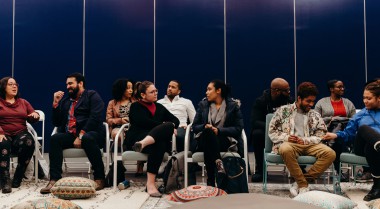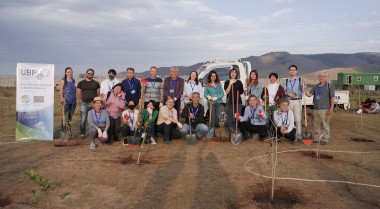How to institutionalise partnerships between the UN and local peacebuilders? Key takeaways from the CSO-UN Dialogue on Peacebuilding
Picture the power of this: people from every corner of the world, deeply committed to peacebuilding, putting their heads together to strengthen their collective action. That is precisely what happened in December 2023 in New York when local peace actors and representatives of UN agencies, funds and programmes, gathered for the inaugural CSO-UN Dialogue on Peacebuilding to discuss peacebuilding strategies and policies and jointly shape global peacebuilding goals. Amongst them were GPPAC members, including Patrick, Tajykan, and Gus.
This Dialogue wasn't just a meeting. It was a collaborative effort to foster stronger ties between the UN and civil society. And succeeded, they did. The Dialogue marked the first steps towards institutionalising partnerships between these two entities. UN representatives provided valuable insights into the inner workings of the UN system, highlighting opportunities and limitations and aiding local peacebuilders in navigating its complexities. Local peacebuilders shared their on-the-ground experiences, contributing essential perspectives ahead of the 2025 Peacebuilding Architecture Review.
With the Dialogue's conclusion, an essential question emerges: What's the next step?
We've collected reflections from local peacebuilders who participated in the Dialogue. They offer thoughtful insights into advancing and broadening the CS-UN partnership for more effective peacebuilding action.
Patrick Bwire, CECORE Uganda: 'impactful peacebuilding is based on community and local knowledge.'
The CSO-UN Dialogue on Peacebuilding showed that there is a growing appreciation by the UN of civil society as one of the key actors in peacebuilding. For our shared goal of delivering impactful peacebuilding, we need to ensure that it is based on community and local knowledge. To realise impactful peacebuilding, UN Country Teams and Regional Offices need to develop community engagement strategies at the field level, putting the existing UN Community Engagement Guidelines into practice, and investing in sustaining local peacebuilding efforts through capacity building. Beyond the UN field presences, we need enhanced implementation of agendas, strategies and guidance that already exist.
Tajykan Shabdanova, Foundation for Tolerance International, Kyrgyzstan: 'strengthen CS-UN collaboration at the regional level.'
Discussions at the global level do not have an immediate impact at the regional level. There are well-known coordination challenges between the global and regional levels. A regional dialogue where the UN at the field level can open the doors for diverse groups would strengthen CS-UN collaboration at the regional level, subsequently informing a more realistic global policy.
Gus Miclat, Initiatives for International Dialogue, the Philippines: 'networks are a one-stop-shop that brings diverse people together around a shared vision.'
Networks are uniquely positioned to channel inclusive and representative learning and knowledge from the local to national to global to local level. Networks provide representative modalities for diverse participation of local actors in peace processes, policy development, and dialogues, such as the CSO-UN Dialogue on Peacebuilding. Policymakers need to change from wariness and distrust to a collaborative mindset with networks. The international community should ensure the participation of civil society in the design of programmatic approaches and financing mechanisms. Networks should make sure that smaller and diverse organisations’ voices are heard and strengthened.
Some of the recommendations from the CS-UN Dialogue on Peacebuilding are:
- On the Role of Networks, Movements and Coalitions in Peacebuilding and Sustaining Peace
- On Quality Financing for Peacebuilding: Community-Focused Accountability and Locally-Led Determination


